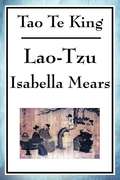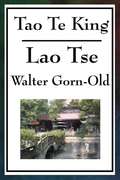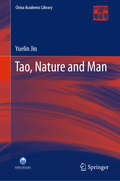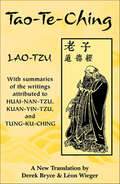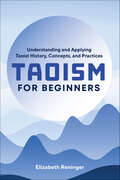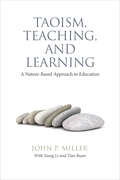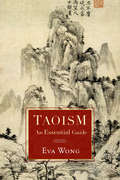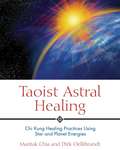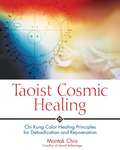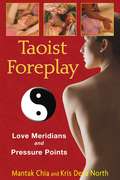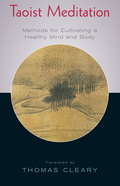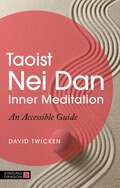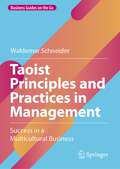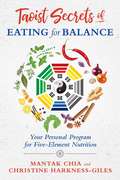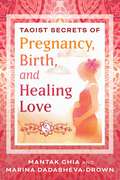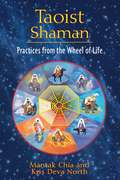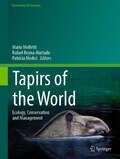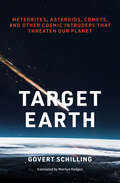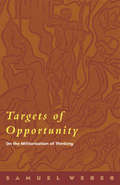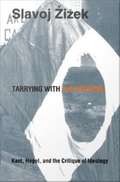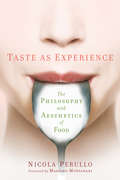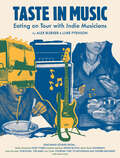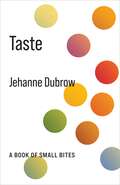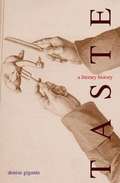- Table View
- List View
Tao Te King
by Isabella MearsThe Tao Te Ching is a spiritual, inspirational work that guides us through life, helping us to live within each moment and find the beauty that is all around each of us. Simple, beautiful, and life changing, the Tao Te Ching is fundamental to the Taoist school of Chinese philosophy (D ojia) and strongly influenced other schools, such as Legalism and Neo-Confucianism. This ancient book is also central in Chinese Buddhism, which when first introduced into China was largely interpreted through the use of Taoist words and concepts. Many Chinese artists, including poets, painters, calligraphers, and even gardeners have used the Tao Te Ching as a source of inspiration.
Tao Te King
by Walter Gorn-OldThe Tao Te Ching is a spiritual, inspirational work that guides us through life, helping us to live within each moment and find the beauty that is all around each of us. Simple, beautiful, and life changing. The Tao Te Ching is fundamental to the Taoist school of Chinese philosophy (Dàojia), and strongly influenced other schools, such as Legalism and Neo-Confucianism. This ancient book is also central in Chinese Buddhism, which when first introduced into China was largely interpreted through the use of Taoist words and concepts. Many Chinese artists, including poets, painters, calligraphers, and even gardeners, have used the Tao Te Ching as a source of inspiration.
Tao, Nature and Man (China Academic Library)
by Yuelin JinThis book presents the research achievements of Jin Yuelin, the first logician and a prominent philosopher in China, who founded a new philosophical system combining elements from Western and Chinese philosophical traditions, especially the concept of Tao. It consists of three sections: the first section interprets Jin’s studies on Chinese philosophy, Russell’s ideology and other general discussions in the field; section 2 includes Jin’s studies on logic, which made him the founding father of modern logic in China; and section 3 presents Jin’s ideas on politics, including his studies on Thomas Hill Green.
Tao-Te-Ching
by Lao TseDesde el siglo V a.c. nos llega la voz de Lao-Tse en los ochenta y un poema del Tao-te-ching. La inusitada modernidad de sus conceptos asombra por la riqueza y variedad del saber que nos transmite. Acercarse al tao es vislumbrar la idea rectora que anima todo lo viviente. A través del tao se comprende tanto la naturaleza y sus leyes como los íntimos movimientos del alma humana. Porque el tao virtud y razón suprema, es fin y medio. Como principio basal, todo lo crea sin salir de su inacción: continúa permanentemente igual a sí mismo, en tanto su creación se desarrolla, cambia y envejece para finalmente morir. Pero el tao es también camino de perfección. Así, en función de tal, se erige en norma de conducta para el ciudadano y el gobernante, para el guerrero y el sabio, para los seres humanos todos.
Tao-Te-Ching: With summaries of the writings attributed to Huai-Nan-Tzu, Kuan-Yin-Tzu and Tung-Ku-Ching
by Derek BryceTranslated by Derek Bryce from Lao-Tzu on Wieger's 1913 French rendition of his Les Peres du Syteme Taoist. This volume also contains Bryce's summaries of writings attributed to Huai-Nan-Tzu, Kuan-Yin-Tzu, and Tung-Ku-Ching from Wieger's Histoire des Croyances et des Opinions Philosophiques en Chine. Bryce demonstrates a conscious commitment to both the original Chinese text and the profound insight of Wieger's work. A Taoist classic to read again and again. Illustrated.
Taoism for Beginners: Understanding and Applying Taoist History, Concepts, and Practices
by Elizabeth ReningerAncient practices for modern lives—the perfect taste of TaoismBegin your journey of spiritual exploration and deepen your connection to the earth. Taoism for Beginners is your easy-to-understand guide to a rich, spiritual tradition that originated in ancient China and offers a new holistic perspective.Discover the core principles and traditions of Taoism with straightforward language and simple exercises you can do anywhere. Adopting aspects of Taoism into your everyday life can bring you into peace and harmony with yourself and the world around you—a practice that's more vital than ever in our busy modern-day lives.Taoism for Beginners helps you:Feel better and feel more—Build your own Taoist practice that can help you relax, de-stress, and feel more at ease in your life.Learn history and tradition—Meet Taoism's founder, Lao Tzu, and learn the basic history of Taoism practice for the past 2500 years.This book and beyond—Deepen your practice (if you wish) with included resources for further reading and study.Explore the depth and breadth of Taoism in a clear format that you can apply to everything you do.
Taoism, Teaching, and Learning: A Nature-Based Approach to Education
by John P. MillerThe ancient Chinese philosophy of Taoism contains profound wisdom about the cosmos, nature, human life, and education. Taoism seeks to be in harmony with nature, and using it as a guide can help us live in a way that is healing to both ourselves and the planet. Taoism, Teaching, and Learning identifies key aspects of Taoist thought and highlights how these principles can promote a holistic approach to teaching and learning. In particular, this book offers educators guidelines and pedagogical examples for how to instil a perspective of interconnectedness into their classrooms. It sheds light on how philosophical Taoism articulates a vision of the universe and life that mirrors the actual realities of nature. Providing frameworks and methods for teaching and learning based on the interconnectedness of life, Taoism, Teaching, and Learning develops an inspiring vision for education and helps us to see our world in a deeply holistic and meaningful way.
Taoism: An Essential Guide
by Eva WongFor the first time, the great depth and diversity of Taoist spirituality is introduced in a single, accessible manual. Taoism, known widely today through the teachings of the classic Tao Te Ching and the practices of t'ai chi and feng-shui, is less known for its unique traditions of meditation, physical training, magical practice and internal alchemy. Covering all of the most important texts, figures, and events, this essential guide illuminates Taoism's extraordinarily rich history and remarkable variety of practice. A comprehensive bibliography for further study completes this valuable reference work.
Taoist Astral Healing: Chi Kung Healing Practices Using Star and Planet Energies
by Mantak Chia Dirk OellibrandtAdvanced techniques for utilizing the universal healing connections revealed by Taoist astrology and astronomy• Provides meditations and healing techniques based on Taoist astrology• Allows readers to develop a personal practice based on an understanding of their planetary strengths and weaknesses• Includes Taoist star practices for expanding personal awareness into a cosmic field of chi that will support others in their efforts to heal and grow spirituallyTaoist Astral Healing provides a step-by-step program for refining our ability to cultivate, circulate, and retain chi from the stars and planets. While the initial focus of Taoism centers on creating physical health that is deeply rooted in the energies provided by the earth, individuals may also draw down energies from the stars and planets to continue to grow in awareness and to develop their full soul potential. Harnessing these energies allows us to break through the cycles of attraction and addiction, promote longevity, and transform the physical and energy body into a “light body” in order to heal ourselves and others.Taoist Astral Healing teaches how to connect the body with the five elemental forces of nature, as well as the moon, sun, planets, stars, and galaxies. Noting the relationships between specific constellations and points on the body--such as the Big Dipper’s correspondence to the bones of the skull--the authors offer planetary and stellar meditations that allow the inner and outer universes to become more connected. Following the numerous meditations and techniques provided throughout the book, readers develop a personal practice based on an understanding of their planetary strengths and weaknesses and their own spiritual growth.
Taoist Cosmic Healing: Chi Kung Color Healing Principles for Detoxification and Rejuvenation
by Mantak Chia• Includes practices for cleansing the blood of toxins, relieving pain, using sexual energy for healing, and other tools for the treatment and prevention of disease• Explains the unique healing potential of chi kung color therapy and how to harness universal and earthly elemental energies in healing• By Mantak Chia, coauthor of The Multi-Orgasmic ManTaoists believe in an underlying unity that permeates the universe and intimately binds all things. Taoist Cosmic Healing presents chi kung techniques that develop and strengthen awareness of the forces and energetic principles of the universe and the earthly six directions, allowing the reader to draw upon these forces for healing themselves and others.Taoist Cosmic Healing teaches the reader how to use the major acupuncture points in the hands to activate, open, and balance the chi meridians throughout the body. This practice allows the student to detoxify and rejuvenate the major organ systems and, when combined with specific body positions and the chi kung stance, to heal others. Through Mantak Chia’s profound understanding of the ancient esoteric science of guiding chi energy, students can learn how to harness the astral energies of specific stars. Master Chia also explains the important role that compassion and positive energy play in enhancing one’s ability to heal. He presents for the first time in the West the details of chi kung color therapy and how it can activate and strengthen the immune system.
Taoist Foreplay: Love Meridians and Pressure Points
by Mantak Chia Kris Deva NorthSexual techniques and traditional Chinese medicine for increased pleasure • Reveals how to enhance relationships by harmonizing male and female energies • Includes easy-to-follow, illustrated acupressure massage routines • Shows how to maintain sexual health with prostate massage and jade egg exercises Taught to Chinese emperors, their wives, and their concubines for thousands of years, Taoist sexual techniques help lovers harmonize their cycles of pleasure and utilize the abundance of reproductive power that is otherwise wasted in non-procreative sex. Combining the study of sex with traditional Chinese medicine, these practices stimulate and sustain sexual desire through the meridians and pressure points and enhance relationships by harmonizing male (yang) and female (yin) energies. Using easy-to-follow illustrations, Taoist Foreplay guides lovers through simple acupressure massage routines connecting all the points and channels that increase pleasure and spark arousal. It shows how to prolong peak moments, maintain sexual health through prostate massage and jade egg exercises, and sustain the intensity of first love through all the seasons of a maturing relationship. It also explains how to reveal and overcome incompatibility with the Taoist Zodiac. From foreplay to climax, these practices offer a way to keep the flame of sexual energy alive.
Taoist Meditation
by Thomas Cleary"The ancient meditation techniques of Taoism encompass a wide range of practices--with an aim toward cultivating a healthy body as well as an enlightened mind. These selections from classic texts of Taoist meditation represent the entire range of techniques--from sitting meditation practices to internal alchemy. Most of the texts appear here in English for the first time. Selections are taken from the following classics: * Anthology on Cultivation of Realization: A document from 1739 (Ming Dynasty) that emphasizes development of the natural, social, and spiritual elements in human life. * Treatise on Sitting Forgetting: A Tang Dynasty text that sets meditation practice in terms familiar to Confucians and Buddhists. * Sayings of Taoist Master Danyang: Wisdom of the Taoist wizard and representative of the Complete Reality School. * Secret Writings on the Mechanism of Nature: An anthology taken from one hundred sixty-three Taoist sources, including ancient classics and works on meditation and spiritual alchemy, along with admonitions and teachings of the great Taoist luminaries. * Zhang Sanfeng's Taiji Alchemy Secrets: A treatise on the inner mediation practices that are the proper foundation of the martial art Taiji. * Secret Records of Understanding the Way: A rare and remarkable collection of talks by an anonymous Taoist master of the later Qing dynasty (1644-1911). Traditional teachings with a sometimes strikingly modern bent. " Thomas Cleary holds a PhD in East Asian Languages and Civilizations from Harvard University and a JD from the University of California, Berkeley, Boalt Hall School of Law. He is the translator of over fifty volumes of Buddhist, Taoist, Confucian, and Islamic texts from Sanskrit, Chinese, Japanese, Pali, and Arabic.
Taoist Nei Dan Inner Meditation: An Accessible Guide
by David TwickenBased on the ancient wisdom of the Taoist tradition, this book translates cryptic, alchemical language into an accessible and straightforward guide to Nei Dan using everyday terms. Focussing on breath work, meditations, and series of movements founded in qi gong, this book aids you in attuning to your true nature and nurtures balance and wellbeing in your physical, spiritual, and psycho-emotional health.Through an integration of Nei Dan inner meditations, this book explains the art of letting go of our traumas, imprints, and conditioning and encourages a reattachment of the self to our true natures. Taoist Nei Dan Inner-Meditation builds upon David Twicken's full collection and provides a comprehensive system of Nei Dan meditation for all professionals working with Chinese Medicine and anyone interested in this form of meditation.
Taoist Principles and Practices in Management: Success in a Multicultural Business (Business Guides on the Go)
by Waldemar SchneiderThe accelerated transformation of businesses poses major challenges to organizations. In its fundamental meaning, leadership is about a systematic way of highlighting the most important goals, combined with continuous execution along the most important principles. This book brings together key themes of Taoism, compiled for international managers who are on their way to becoming trusted leaders. After a brief outline of the guiding concepts, it discusses an application of selected teachings enriched by narratives from appropriate references and relevant verses from the Tao Te Ching (TTC). In this context, each individual yet coherent Taoist principle is applied in terms of its relevance to varying business environments.By providing embedded case studies, this book offers new ideas for managers to incorporate Taoist principles into their leadership strategies.
Taoist Secrets of Eating for Balance: Your Personal Program for Five-Element Nutrition
by Mantak Chia Christine Harkness-GilesExplains how to use your Taoist astrology birth chart as a personal nutritional guide for health, longevity, and organ energy balance • Explores how to help balance your birth chi through your eating habits as well as explaining how foods address your five-element energetic profile • Provides detailed food lists based on ancient Taoist wisdom that reveal their effect on the Yin, Yang, and five-element energies • Shows how your five-element energies outline your life and influence success in relationships and at work We are each born with a unique combination of heavenly and earthly energies defined by the five elements and dictated by the universe at the moment you take your first breath. This “birth chi” can be calculated using the year, month, day, and time of your birth, and it reveals your personal profile of health and emotional strengths and weaknesses as well as the energy cycles you will encounter throughout your life. In this Inner Alchemy astrology nutrition guide, Master Mantak Chia and Christine Harkness-Giles explore how to strengthen your birth chi through your eating habits, revealing which foods will address imbalances in your five-element organ energy profile. The authors explain which organs are connected with each element--fire, earth, metal, water, and wood--and provide detailed food lists based on ancient Taoist wisdom that reveal the energetic temperature, flavor, and organ related to many common foods and superfoods. They emphasize the importance of local, seasonal, and fresh foods and of yin-yang balance for health. The authors illustrate the five elements’ characteristics through sample profiles for celebrities such as Paul McCartney and Meryl Streep, along with Taoist nutritional recommendations based on their charts. The authors also explore how your Inner Alchemy astrology profile determines your life and relationships and explain how Inner Alchemy practices and five-element nutrition can improve all aspects of your life. By eating in line with your personal five-element energetic profile, as part of ancient Inner Alchemy techniques, you can improve health and longevity and strengthen connections with your loved ones and the energies of the cosmos.
Taoist Secrets of Pregnancy, Birth, and Healing Love
by Mantak Chia Marina Dadasheva-Drown• Explains the energetic principles of cellular Taoism in the process of conception• Presents step-by-step instructions for practices that can aid in successful conception and healthy pregnancy, including Smiling Deer Practice, which allows you to incorporate optimum chi to reduce the likelihood of birth defects and other problems• Explores Taoist principles on birth and the formative first moments of life, including when to cut the umbilical cordPresenting a Taoist approach to healthy conception, pregnancy, birth, and early parenting, Taoist Master Mantak Chia and professional doula Marina Dadasheva-Drown explore the Universal Healing Tao practices behind the creation of healthy, happy children.Explaining Taoist energetic principles, the authors discuss how the first cells of the fetus, the primordial stem cells, are designed to receive a soul. They look at the role of sound vibration, including the mother&’s heartbeat, in the process of conception and soul implantation as well as the mechanics of primal energy generation from the fusion of sperm and egg. They offer step-by-step instructions for a wealth of practices that can aid in successful conception and healthy pregnancy, including the energetic channels of the Microcosmic Orbit and the conception alchemy they make possible as well as how this can be enhanced by Healing Love practices. And they examine the power of positive thinking in conception, pregnancy, and birth and how to prepare for birth with jade egg practices.Revealing the power of preparation and energetic intention in the alchemical process of conception, this book shows how to cultivate a strong and vital body and spirit prior to parenthood to ensure a successful pregnancy and healthy baby.
Taoist Shaman: Practices from the Wheel of Life
by Mantak Chia Kris Deva NorthThe shamanic roots of Taoist practice • Explains the principles of the Taoist Medicine Wheel, including the Five Elements, the animals of the Chinese zodiac, and the trigrams of the I Ching • Includes exercises from the “Wheel of Love” to access the Tao of Ecstasy • Contains illustrated teaching stories about the Eight Immortals Thousands of years ago the immortals known as the Shining Ones shipwrecked on the Chinese coast. Passing their shamanic practices--such as ecstatic flight and how to find power animals and spirit guides--on to the indigenous people, they also taught them the wisdom of the Medicine Wheel. From the Taoist Medicine Wheel came the principles of Yin and Yang, the Five Elements, the Eight Forces, the Chinese zodiac, and the I Ching. The Taoist Medicine Wheel can also be found at the foundation of traditional Chinese medicine and the esoteric sexual practices of Taoist Alchemy. In the Taoist Shaman, Master Mantak Chia and Kris Deva North explain the shamanic principles of the Taoist Medicine Wheel, how it is oriented on the Five Elements rather than the Four Directions, how it relates to the twelve animals of the Chinese zodiac and the trigrams of the I Ching, and how it aligns with the Eight Forces of the Pakua. Through illustrated teaching stories, the authors show how the energetic principles of each of the Eight Forces are reflected in the Eight Immortals. Revealing the wheel’s application to sacred sexuality, they offer exercises from the “Wheel of Love” to strengthen and deepen relationships as well as providing a means to access the Tao of Ecstasy.
Tapirs of the World: Ecology, Conservation and Management (Fascinating Life Sciences)
by Mario Melletti Rafael Reyna-Hurtado Patrícia MediciThis beautifully illustrated book is the first comprehensive work ever published on all four tapir species worldwide, filling a gap in the scientific literature. The book provides information on the systematics, phylogeny, evolution, ecology, conservation, and management of all tapir species. This volume is aimed at a wide range of readers, including researchers, wildlife managers, zoologists, conservation biologists, ecologists, veterinarians, zoo staff, students and environmental policy makers.
Target Earth: Meteorites, Asteroids, Comets, and Other Cosmic Intruders That Threaten Our Planet
by Govert SchillingAn acclaimed science writer tells the story of cosmic projectiles that may be on a collision course with our Earth.The impact of an asteroid led to the extinction of the dinosaurs. Could another giant cosmic missile soon be heading our way? In Target Earth, acclaimed Dutch astronomy writer Govert Schilling provides a full account of what we know, and need to know, about all the extraterrestrial matter constantly bombarding our planet—from microscopic dust particles and space debris to massive meteorites, comets, and asteroids.Drawing on the latest scientific discoveries, Schilling explores virtually every aspect of cosmic impacts—from small meteorites to devastating collisions, from the craters that mark our planet&’s surface to the impacts that left their mark on other celestial bodies, and from searches for near-miss lumps of rock to ways of protecting humanity from an assault from the cosmos. Along the way, he considers near misses in the past and the possibility of others in the future and ponders the positive side of these visitations from space: If our planet had not been the target of cosmic rubble from its very formation, life on Earth would likely never have gotten started.
Targets of Opportunity: On the Militarization of Thinking
by Samuel WeberThe title of this book echoes a phrase used by the Washington Post to describethe American attempt to kill Saddam Hussein at the start of the war againstIraq. Its theme is the notion of targeting (skopos) as the name of an intentionalstructure in which the subject tries to confirm its invulnerability by aiming todestroy a target. At the center of the first chapter is Odysseus’s killing of the suitors;the second concerns Carl Schmitt’s Roman Catholicism and Political Form; thethird and fourth treat Freud’s “Thoughts for the Times on War and Death” and“The Man Moses and Monotheistic Religion.” Weber then traces the emergenceof an alternative to targeting, first within military and strategic thinking itself(“Network Centered Warfare”), and then in Walter Benjamin’s readings of“Capitalism as Religion” and “Two Poems of Friedrich Hölderlin.”
Tarrying with the Negative: Kant, Hegel, and the Critique of Ideology
by Slavoj I EkIn the space of barely more than five years, with the publication of four pathbreaking books, Slavoj Zizek has earned the reputation of being one of the most arresting, insightful, and scandalous thinkers in recent memory. Perhaps more than any other single author, his writings have constituted the most compelling evidence available for recognizing Jacques Lacan as the preemient philosopher of our time. In Tarrying with the Negative, Zizek challenges the contemporary critique of ideology, and in doing so opens the way for a new understanding of social conflict, particularly the recent outbursts of nationalism and ethnic struggle. Are we, Zizek asks, confined to a postmodern universe in which truth is reduced to the contingent effect of various discursive practices and where our subjectivity is dispersed through a multitude of ideological positions? No is his answer, and the way out is a return to philosophy. This revisit to German Idealism allows Zizek to recast the critique of ideology as a tool for disclosing the dynamic of our society, a crucial aspect of which is the debate over nationalism, particularly as it has developed in the Balkans--Zizek's home. He brings the debate over nationalism into the sphere of contemporary cultural politics, breaking the impasse centered on nationalisms simultaneously fascistic and anticolonial aspirations. Provocatively, Zizek argues that what drives nationalistic and ethnic antagonism is a collectively driven refusal of our own enjoyment. Using examples from popular culture and high theory to illuminate each other--opera, film noir, capitalist universalism, religious and ethnic fundamentalism--this work testifies to the fact that, far more radically than the postmodern sophists, Kant and Hegel are our contemporaries.
Taste as Experience: The Philosophy and Aesthetics of Food (Arts and Traditions of the Table: Perspectives on Culinary History)
by Nicola PerulloTaste as Experience puts the pleasure of food at the center of human experience. It shows how the sense of taste informs our preferences for and relationship to nature, pushes us toward ethical practices of consumption, and impresses upon us the importance of aesthetics. Eating is often dismissed as a necessary aspect of survival, and our personal enjoyment of food is considered a quirk. Nicola Perullo sees food as the only portion of the world we take in on a daily basis, constituting our first and most significant encounter with the earth. Perullo has long observed people's food practices and has listened to their food experiences. He draws on years of research to explain the complex meanings behind our food choices and the thinking that accompanies our gustatory actions. He also considers our indifference toward food as a force influencing us as much as engagement. For Perullo, taste is value and wisdom. It cannot be reduced to mere chemical or cultural factors but embodies the quality and quantity of our earthly experience.
Taste in Music: Eating on Tour with Indie Musicians
by Luke Pyenson Alex BleekerA Pitchfork Best Book of 2024A Saveur Best Narrative Food Book of 2024In this unique and deeply thoughtful collection, musician Alex Bleeker (Real Estate) and food and travel journalist Luke Pyenson (formerly of Frankie Cosmos) take readers on tour with a diverse lineup of inspiring indie musicians from around the world, sharing meals and travel experiences, peeking behind the curtain at this singular and singularly misunderstood way of life.Through original essays and engaging conversations with dozens of indie musicians representing several subgenres, scenes, and eras, food takes center stage in stories about being on tour and eating on tour and how this basic human necessity can create a sense of community and interconnectedness in one of the most mobile industries in the world. Based broadly on the subject of eating on tour, these entries each spin off into their own focused and exciting behind-the-scenes story, but all confirm what Pyenson and Bleeker suspected all along—food looms large in the lives of touring musicians, and it can be used as a gateway into understanding what going on tour is really like.Featured contributors include:Robin Pecknold (Fleet Foxes) Chris Frantz (Talking Heads) Natalie Mering (Weyes Blood) Mark Ibold (Pavement)John Gourley (Portugal. The Man)Lily Chait (touring chef to boygenius and Phoebe Bridgers) Amelia Meath (Sylvan Esso)Greta Kline (Frankie Cosmos) Devendra BanhartBob Mould (Hüsker Dü) Brian "Geologist" Weitz (Animal Collective)Dawn RichardSasami Ashworth (SASAMI)Sadie Dupuis (Speedy Ortiz)The BethsIn addition to wide-angle meditations about eating on tour, Pyenson and Bleeker have gathered stories that take place on five continents, in private homes and street-side stalls, in temples of fine dining and in actual temples, backstage and in the van, early morning and late at night. Stories that deal with the best parts of touring: meaningful cultural exchange, hospitality-induced euphoria, and the opportunity to build relationships around the world. And the worst: loneliness, exhaustion, estrangement from family and friends, struggles with disordered eating, and unsteady access to medical care.So the question isn’t, “How was tour?” It’s, “What do you eat on tour?” Like the best songs or meals, these conversations and essays evoke something central about the human experience. They show us all the ways that music and food bring us together, break us down, lift us up, and add color to our lives.NOTABLE AUTHORS: With over twenty years of experience in the music industry, Alex Bleeker and Luke Pyenson are your perfect guides into the world of touring. Having toured with their own bands—Real Estate and Frankie Cosmos, respectively—they're asking all the right questions, shedding light and understanding on the lives of touring musicians and the people feeding them.FOOD ANTHOLOGY & MUSIC SCENE DEEP CUT: With interviews and essays from about forty different musicians, chefs, and promoters—ranging from Chris Frantz from Talking Heads to boygenius’s private chef Lily Chait—not only is this book a treasure trove of knowledge and insider information, it also offers something for foodies and music enthusiasts alike.ARMCHAIR TRAVEL: Go behind the curtain all around the world, from America to Russia, Japan to Italy, and dozens of places in between. Read about your favorite musicians’ experiences abroad, all from the comfort of your home. Perfect for:Musicians and fans of indie musicFoodies, chefs, restaurant owners, and home cooksAnyone interested in the music businessTravel enthusiasts Readers who enjoyed <em
Taste: A Book of Small Bites (No Limits)
by Jehanne DubrowTaste is a lyric meditation on one of our five senses, which we often take for granted. Structured as a series of “small bites,” the book considers the ways that we ingest the world, how we come to know ourselves and others through the daily act of tasting.Through flavorful explorations of the sweet, the sour, the salty, the bitter, and umami, Jehanne Dubrow reflects on the nature of taste. In a series of short, interdisciplinary essays, she blends personal experience with analysis of poetry, fiction, music, and the visual arts, as well as religious and philosophical texts. Dubrow considers the science of taste and how taste transforms from a physical sensation into a metaphor for discernment.Taste is organized not so much as a linear dinner served in courses but as a meal consisting of meze, small plates of intensely flavored discourse.
Taste: A Literary History
by Denise GiganteWhile most accounts of aesthetic history avoid the gustatory aspects of taste, this book rewrites standard history to uncover the constitutive and dramatic tension between appetite and aesthetics at the heart of British literary tradition. From Milton through the Romantics, the metaphor of taste serves to mediate aesthetic judgment and consumerism, gusto and snobbery, gastronomes and gluttons, vampires and vegetarians, as well as the philosophy and physiology of food. The author advances a theory of taste based on Milton's model of the human as consumer (and digester) of food, words, and other commodities--a consumer whose tasteful, subliminal self remains haunted by its own corporeality. Radically rereading Wordsworth's feeding mind, Lamb's gastronomical essays, Byron's cannibals and other deviant diners, and Kantian nausea, Taste situates Romanticism as a period that naturally saw the rise of the restaurant and the pleasures of the table as a cultural field for the practice of aesthetics.
